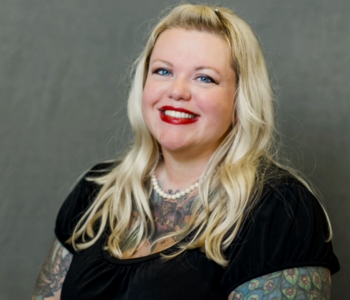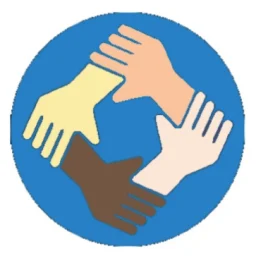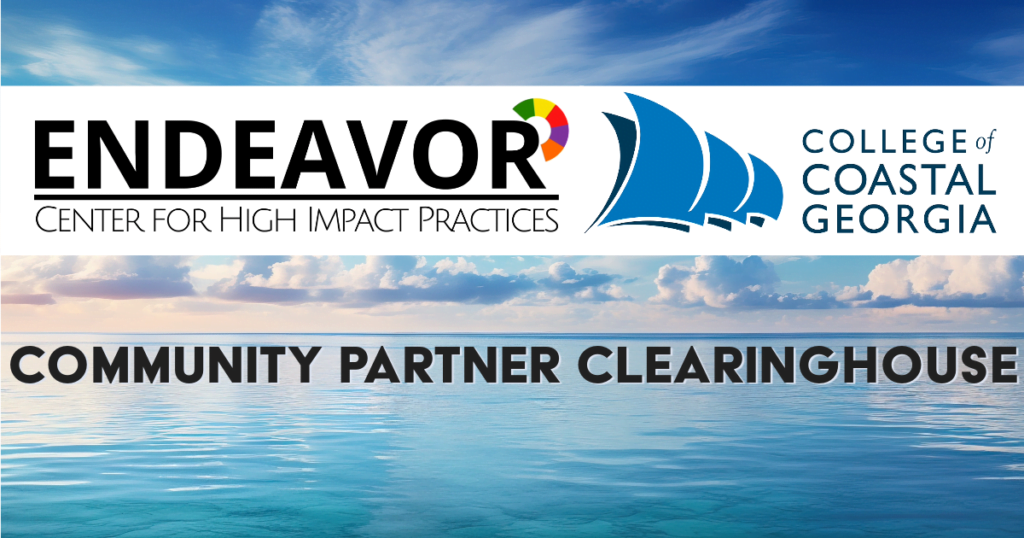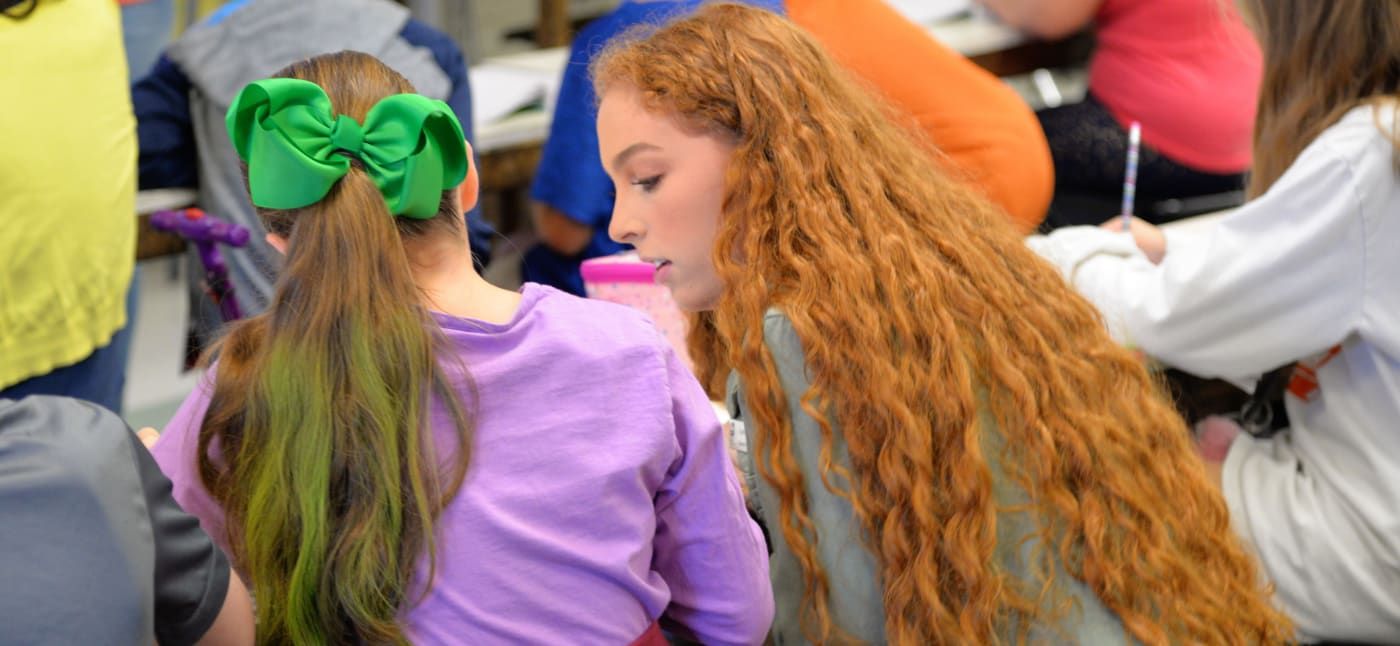Student Experience at the College of Coastal Georgia
-
Dr. Mary McGinnis
 Director of the ENDEAVOR Center for High Impact Practices,
Director of the ENDEAVOR Center for High Impact Practices,
Director of the Center for Teaching & Learning
Service-Learning Information
Service-learning is a teaching and learning method that utilizes a combination of academic course content and relevant service with community agencies. Here at Coastal, all service-learning is completed through a specially designated course. Classroom learning for students is augmented with service activities that are intended to provide exposure to and enhanced understanding of course concepts and theories. Through structured reflection on their service activities, students gain a deeper understanding of course content, develop skills in community leadership, and advance their appreciation of social responsibility, global awareness, and diversity. Service-learning allows students to practically apply and test their academic learning through hands-on career and professional development opportunities that also promote community interests.
Service-learning courses can be found when looking at the Academic Course Schedule and looking for this symbol:

Each service-learning course challenges students to collaborate with their peers, faculty members, and a community partner agency representative to address real-world problems with knowledge-based and active interventions. Every service-learning project relates to the learning goals and objectives of that particular course. The service element of the course is built into the curriculum just as traditional assignments, quizzes, and projects are. Student reflection activities are used to link the learning from the academic course content to the experience of the service activity.
Service-learning emphasizes meaningful student learning through applied, active learning that draws on multiple knowledge sources (academic, student knowledge and experience, and community knowledge). Service-learning also provides students with ample opportunities for gaining practical experience within a discipline and with critical reflection. Effective service-learning courses are those that use service and civic engagement to integrate and enhance academic learning, not to take the place of it. Service-learning allows students to practically apply and test their academic learning through hands-on opportunities that also promote community interests.
Service-learning helps students discover the skills that will make them successful beyond college. Problem identification, teamwork, professional communication, planning, overcoming obstacles, and creating solutions to high level community problems are just some of the skills that are promoted through service-learning projects. Although the projects themselves are important, the learning, connection to course content, and skill development are the overall learning objectives of all service-learning courses.
Students in service-learning designated courses make a commitment to become actively involved in a service project or dedicating a certain amount of service hours to an organization. Students are graded through a variety of structured reflection activities which range from classroom discussions to reflective end-of-course essays and presentations.
Service-learning goes above and beyond community service and volunteerism. While those activities are an important part of community engagement, service-learning differs in several ways. First, the service activities address specific community needs related to learning goals and objectives of a particular course of the students providing the service.
Service-Learning also differs from community service or volunteerism in that:
- It is academically integrated — service is part of the coursework, not an unrelated “add on” requirement.
- Service-learning projects are purposefully designed service projects that focus on community needs AND academic outcomes.
- Students are evaluated on the learning gained from their service experience.
- It includes substantial, ongoing forms of structured reflection and analysis (before, during, and after the service).
- It values student and community knowledge and involves community collaborators in the design of the course and service project.
- The service typically lasts the duration or majority of the semester, and experiences are intended to build upon themselves and on the accumulation of classroom knowledge.
- It is based on collaboration and reciprocal relationships between faculty, students, and community partners.
- Community partners work together with service-learning students and faculty members to identify community problems and interventions.
- Projects typically have real world challenges that students, community partners, and faculty must overcome together.
Our motto for students is: “Serve. Learn. Succeed.” We believe that well-designed service-learning experiences help students gain a deeper understanding of course content, develop skills in community leadership, and advance their appreciation of social responsibility, global awareness, and diversity. At the same time, we expect that the community agencies with whom our students serve will equally benefit from their connection to the College.
By anchoring service-learning in the core curriculum, the College of Coastal Georgia is making a long-term commitment to engaged teaching, learning, and community outreach and is affirming its desire to become Georgia’s College of Service-Learning. The College’s vision is to provide outstanding education for tomorrow’s leaders and citizens through service-learning, global awareness, and engaged entrepreneurship.
The primary goals of the Center for Service-Learning are to:
- Engage in a sustained effort to cultivate partnerships of mutual benefit between community agencies, faculty, and students.
- Develop student leaders in the field of service-learning.
- Provide training, support, and incentives for faculty interested in the integration of service-learning into teaching, research, and scholarship.
- Assess and evaluate the institution’s service-learning program.
The development and implementation of service-learning fits well within the College’s mission by “Advocating excellence in scholarship and community engagement” and offering “student–centered programs that offer a rich and diverse student experience.” Service-learning also contributes to the College’s mission by ensuring that “Students are prepared for meaningful careers, advanced study, lifelong learning, and participation in a global and technological society.” The College’s commitment to service-learning enhances its broader institutional goals of encouraging civic engagement among students and increasing outreach to local communities.
The College of Coastal Georgia’s Center for Service-Learning annually hosts the Service-Learning Symposium as part of the ENDEAVOR Conference that is open to the public. The event highlights service-learning partnerships and projects completed over the past academic year. The Symposium creates opportunities for students, faculty members, and community partners to engage in dialogue about service-learning and other experiential forms of learning.
Learn more about the Service-Learning Symposium and the ENDEAVOR Conference here.
The Symposium includes a Poster Showcase and an Excellence in Service-Learning Award Ceremony. The Poster Showcase provides an opportunity for students to reflect and engage in dialogue centered on their service-learning experience. The event also allows the community, faculty, and students to explore opportunities for collaboration, networking, and even career paths for students. The community is able to see the impact of a broad spectrum of service-learning and research activities that engage students and faculty in addressing community needs.
The Excellence in Service-Learning Award Ceremony recognizes outstanding students, faculty and community partners in their commitment to service-learning during the previous academic year. Nominations for the awards are gathered from students, faculty members, Deans, and Department Chairs. Check out the webpages below to see poster and presentation examples, as well as previous Excellence in Service-Learning winners.
Previous Symposia:
The Center for Service-Learning invites you to explore our Service-Learning Project Archive which highlights the wonderful work our faculty and students are doing in collaboration with our community partner agencies.
Welcome Students!
Service-learning courses are possibly some of the most meaningful courses that you will take in your academic career. Education through these courses will help you apply the knowledge that you have learned in the classroom to real-world situations. The Center for Service- Learning can help you find opportunities on campus as well as in the community. Our door is always open if you would like to meet with us or discuss possible service-learning courses. We encourage the students of the College to be as involved and active in their education as possible. We can be found in the Correll Center for Teacher Education and Learning on the first floor, in suite 112A.
Our goal is help you Serve, Learn, and Succeed!
Service-learning objectives:
- Provide Academic Enhancement by linking service experiences to course content utilizing critical thinking and reflection skills
- Use Civic Learning to enable community engagement and promote leadership skills
- Promote Professional and Personal Growth and openness to global and diverse perspectives
Participation in service-learning courses provides students with outstanding academic and career benefits that include:
- A deeper understanding of course concepts through the opportunity to test and apply ideas in hands-on, real life community environments
- Development of research, critical thinking, analytic, and interpersonal skills
- Improved decision-making and problem-solving skills
- A deeper and broader appreciation of the profession/career skills
- Enriched learning experience through hands-on active learning
Personal & Professional Growth
- Ability to test out your skills, interests, and values in a potential career path, or learn more about a field that interests you
- Opportunity to explore, diversify, or cement your values and beliefs
- Grow your understanding of diverse cultures and communities
- Develop stronger professional communication skills
- Improved ability to handle ambiguity and be open to change; become more flexible
- Enhanced preparation in your field and will also help you with your first entry-level position or even graduate school
Civic Learning
- Makes a positive contribution to the community
- Develops leadership, social interaction and civic responsibility through active community involvement
- Provides understanding of how to access the larger community as a resource
- Introduction to social issues and their root causes
- Helps build a commitment for serving, learning, and succeeding in all things
- Addresses complex community issues and identifies individual/group needs
Remember, the Center for Service-Learning is here to help! We can answer any questions you may have, provide resources or examples, help brainstorm ideas of how to integrate service-learning into the classroom, help find potential community partners and projects, and really anything that relates to service-learning or civic engagement here at the College. You can reach us at: ServiceLearning@ccga.edu or by phone at 912.279.5963.
Service-Learning Scholars Program
The Service-Learning Scholars Workshop provides the opportunity for a select cohort of College of Coastal Georgia faculty to engage in dialogue about student-centered, experiential education that promotes academic learning while serving genuine community needs. The intensive two-week workshop series, facilitated by the Director of Service-Learning, is designed to deepen faculty participants’ understanding of service-learning and guide them as they integrate S-L into their course curriculum and pedagogy. Foundational information on service-learning and community partnership building is covered through discussion, online reading modules, and veteran service-learning faculty member presentations. Participating faculty commit to incorporating service-learning into at least one new or existing course within an academic year.
If you have questions or comments about the program, please feel free to contact the Center for Service-Learning at ServiceLearning@ccga.edu.
Faculty Benefits
Faculty can benefit personally and professionally from integrating service-learning into courses. Teaching with service-learning can give faculty the opportunity to:
- Engage and motivate students
- Establish connections between theory and application
- Connect service to current issues as they relate to academic areas of interest
- Increase overall awareness of community issues, encouraging faculty to shift from the “expert on top” to the “expert on tap”
- Demonstrate how academic theories and information become relevant as they are applied to actual situations
- Improve communication of theoretical concepts through the availability of community-based learning experiences
- Empower students to use their knowledge and skills in a service/real-world capacity
- Build community and college relationships
- Foster a culture of student participation and leadership on campus
- Contribute to student retention by helping students develop a sense of community within the class and an active culture of intellectual discourse
- Encourage a better understanding of the social and moral implications of education and of civic and social responsibility
- Offer opportunities to tap into expertise of community agencies as co-educators and research collaborators
Definition of a Community Partner
Service-learning is premised on the idea of partnerships of mutual benefit, where community organizations, the college’s faculty, and students work together to identify problems and interventions in the community. A service-learning approach views the community not simply as a teaching laboratory but an equal partner. Therefore, equal emphasis is placed on promoting student learning and addressing community needs. It is expected that community partner organizations will collaborate in the design of the service-learning project and provide feedback on the effectiveness of partnership activities.
What do service-learning partnerships look like?
Service-learning partnerships can take on a variety of forms. What’s important is that the student’s project(s)/placement(s) are determined through a discussion that considers and balances your agency’s needs, the academic course goals and objectives, and student interests in service.
Areas of service may include the following:
- Direct service: Students interact directly with staff or clients from your organization (e.g., reading to elementary school students, providing services, collecting oral histories working on site).
- Indirect service: Service often takes place “behind the scenes” (e.g. researching target markets, analyzing surveys, providing website updates).
- Advocacy: Students help promote or create an awareness of a community issue (e.g., creating marketing materials, public speaking, planning/participating in advocacy events or activities).
- Research: Students, faculty and community members collaboratively engage in research with the purpose of solving a pressing community problem or supporting the activities of a local community organization.
Why Participate in Service-Learning with the College of Coastal Georgia?
Staff members at community organizations may have various reasons for welcoming service-learning collaborations, including:
- Helping Build Capacity in your Organization
- Creating short-term and long-term solutions to pressing community needs
- Gaining additional human resources needed to achieve organizational goals
- Injecting new energy, enthusiasm, and perspectives into the organization’s work
- Growing the organization’s volunteer pool; service-learning students will share their experiences with friends and classmates or may volunteer after their service-learning course is over
- Providing awareness of community needs and the agencies which provide for them
- Utilizing service-learning as an outreach activity, increasing visibility for the organization and its work
- Creating potential for additional partnerships and collaboration with the College
- Increased public awareness of key issues
- Cultivating a new generation of caring and experienced citizens and volunteers
- Opportunities to contribute to the educational process of college students
- Reaching out to and educating students/youth about community issues – an important part of any organization’s future support

The Community Partner Clearinghouse is a resource to promote College-community partnerships.







